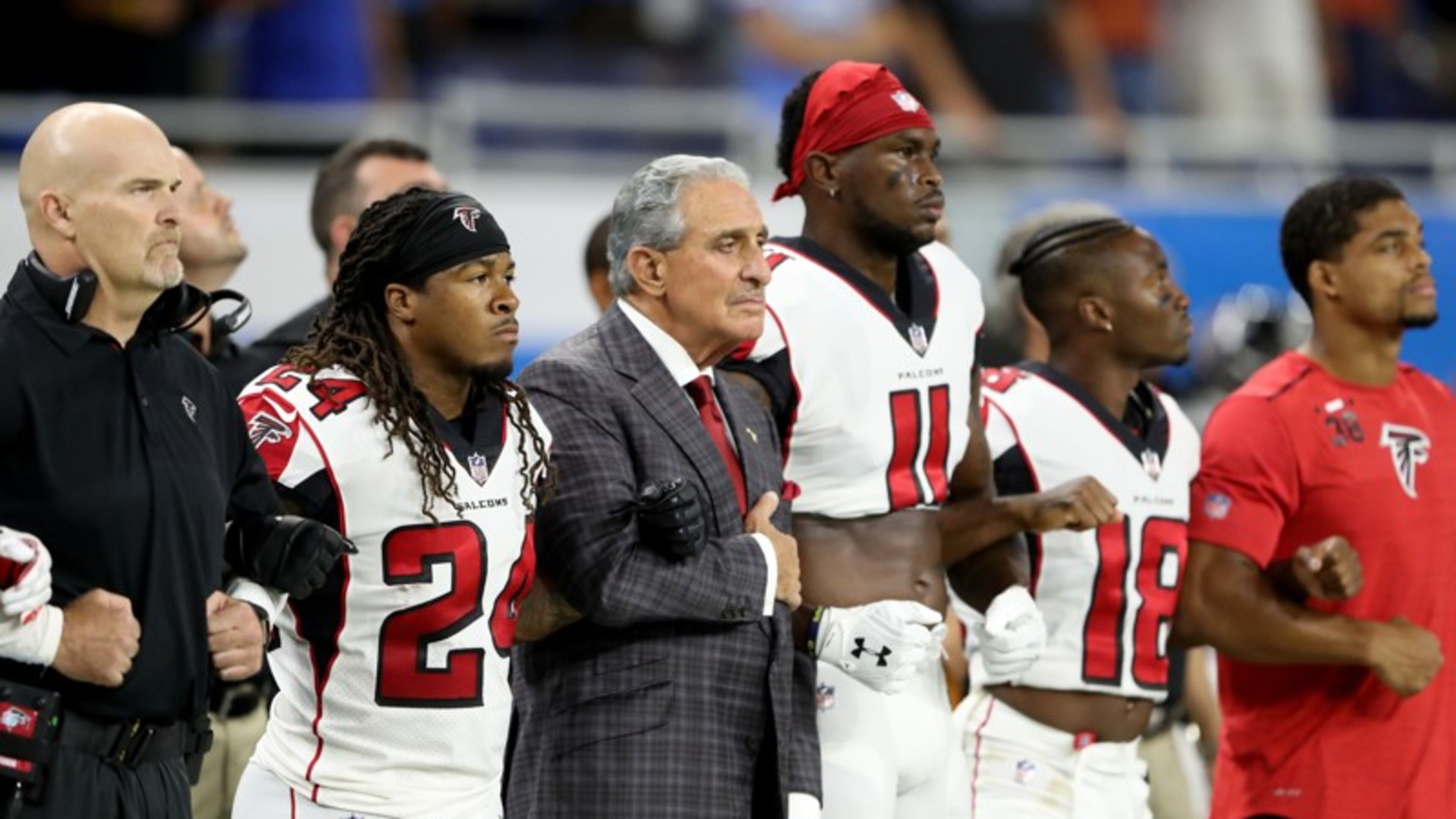Arthur Blank on NFL kneelers: 'Players have no interest in being disrespectful to flag'

President Donald Trump has Tweeted up
a storm this morning,
whose son was picked up for shoplifting in China, to a downed U.S. Navy cargo plane off Okinawa.
Trump is apparently referencing a highly sourced Washington Post article published on Tuesday that began thusly:
Some NFL owners believe there is a strong possibility they will enact an offseason change to the league’s national anthem policy if players’ protests during the anthem persist through the end of this season, reverting to a previous approach of keeping players in the locker room while the anthem is played, according to several people familiar with the league’s inner workings.
We reference this because GPB's Rickey Bevington posted a wide-ranging interview with Atlanta Falcons owner Arthur Blank late Tuesday. Among the topics covered was anthem-kneeling. Blank defended his players:
“It's very clear that the players have no interest whatsoever in being disrespectful to the flag or the anthem. I think that what they're trying to do is get some attention on what they view as some of the social injustice issues we’re dealing with.
“Dealing with facts relating to racism, dealing with facts relating to criminal injustice, bail procedures, police accountability. They have close relationships with policemen and policewomen. I think police accountability, like life accountability, is important.
“They also understand the country. And this is my view -- that the flag is a fabric. I think the flag stands for certain things. It stands for our Constitution. It stands for our civil rights. It stands for all of our Amendments that go with the Constitution….”
On a related note, we'd be remiss if we didn't point you to this piece by the AJC's Eric Stirgus:
Kennesaw State University president Sam Olens did not follow state guidance when the university made a change that kept cheerleaders from kneeling on the football field during the national anthem, a report released Tuesday concluded.
University System of Georgia officials told Olens and the presidents of its public universities during a two-day October meeting that taking a knee during the anthem is free speech protected by the U.S. Constitution and should not be interfered with, unless it causes a disruption. Any changes by a college should be discussed with the USG.
The Saturday after that meeting, KSU implemented a change that kept its cheerleaders in its stadium tunnel before the anthem. That was a week after five cheerleaders had first taken a knee on the field. Olens did not discuss the change with USG officials, who learned about it through an Atlanta Journal-Constitution article.
***
After remaining silent for more than a week, President Donald Trump all but endorsed Roy Moore, the U.S. Senate candidate in Alabama, discounting the sexual assault allegations against him and insisting repeatedly that voters must not support Moore's "liberal" rival. From the Associated Press:
The president said he would announce next week whether he will campaign for Moore, who faces Democrat Doug Jones in a Dec. 12 special election to fill the seat once held by Attorney General Jeff Sessions.
"Roy Moore denies it, that's all I can say," Trump said Tuesday. In fact, he repeated 10 times in a 5-minute session outside the White House that the GOP candidate has denied any wrongdoing.
Trump’s decision puts him at odds with the Republican National Committee, which has withdrawn its support from Moore, and Senate Majority Leader Mitch McConnell, R-Ky.
How does the Alabama fracas stand? According to fivethirtyeight.com, "the average of surveys fielded after the first accusations shows the race exactly tied."
***
Immediately after he was sworn in nearly eight years ago, Atlanta Mayor Kasim Reed tackled the city's underfunded pension system. As he leaves, it appears the topic is still on his mind.
Some of the parties involved are raising the alarm about a proposed ordinance that would allow the mayor to appoint a majority of the trustees of a consolidated pension board that oversees $3 billion in assets. Click here to download a Nov. 7 letter to City Council from Doug Strachen, who chairs the General Employees' Pension Fund. Or simply read it here:
***
A case now before the Fifth U.S. Circuit Court of Appeals, challenging a Texas state policy that requires faculty to permit concealed weaponry in college classrooms, bears some watching for potential impact here.
Here's a line or five from the amicus brief filed by the American Association of University Professors:
“[The] decision whether to permit or exclude handguns in a given classroom is, at bottom, a decision about educational policy and pedagogical strategy.
It predictably affects not only the choice of course materials, but how a particular professor can and should interact with her students—how far she should press a student or a class to wrestle with unsettling ideas, how trenchantly and forthrightly she can evaluate student work.
Permitting handguns in the classroom also affects the extent to which faculty can or should prompt students to challenge each other.
The law and policy thus implicate concerns at the very core of academic freedom: They compel faculty to alter their pedagogical choices, deprive them of the decision to exclude guns from their classrooms, and censor their protected speech.”

